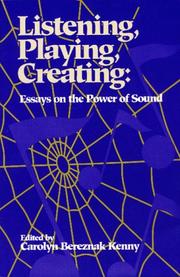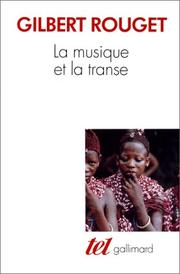| Listing 1 - 10 of 13 | << page >> |
Sort by
|
Book
Year: 1939 Publisher: Cincinnati : College of Music,
Abstract | Keywords | Export | Availability | Bookmark
 Loading...
Loading...Choose an application
- Reference Manager
- EndNote
- RefWorks (Direct export to RefWorks)
"The present volume is a cooperative work representing the results of wide research conducted by the authors during a number of years. In 1926, one of them published a favorably received study of "The Influence of Music on Behavior." Meanwhile, the other writer had been carrying on researches of a somewhat similar character, and had organized the results of musical studies which have been carried out during the last decade. It occurred to them to combine their results in the form of a General Psychology of Music, conceived on a different plan than any hitherto followed by writers on this subject. It appears to the authors of this book that most similar works offer a limited conception of music, having been written primarily for musicians, students of music, physicists, critics and other special classes of readers. It is assumed that music is an art or technique more or less divorced from life, and that the psychology of music is limited to a study of responses--to its mere elements, or, a discussion of the abstract relationships between such elements. We think of music as no isolated abstract art--a mere element of culture--but as a form or phase of culture inextricably blended with its other phases. In short, music is a form of living, influencing and influenced by every other form of living. We have traced the influence of music on religious and economic life, on philosophy, morals, and medicine. These facts account for the great amount of sociological material incorporated in these pages. If musical stimuli have really played such a role in biological evolution as our analysis suggests, the general influence of music on the organism is a deductive fact requiring no further proof. It is, however, of interest chiefly as a background to studies of specific musical effects, the presence of which, if found by experiment on a few individuals, would still be a doubtful basis for a generalization in the absence of some general conditions for the appearance of musical effects. By organizing all the available series of data on musical influences, from ethnology, sociology, and culture history, as well as from experiment, we may derive a convergent proof of the influence of music on the organism, which will be more satisfactory than one based on any single series of data with its inherent limitations. Our purpose then is to study the influence of music on the organism. We approach music from the practical rather than from the aesthetic stand-point, regarding it as a necessity, a possible means of re-education and human reconstruction for all, rather than a mere subject of unproductive pleasure, or an object for criticism from the learned few. Our general method will be genetic as well as experimental"--Introduction. (PsycINFO Database Record (c) 2015 APA, all rights reserved).
Book
ISBN: 9780190265250 9780190265267 Year: 2018 Publisher: New York, NY : Oxford University Press,
Abstract | Keywords | Export | Availability | Bookmark
 Loading...
Loading...Choose an application
- Reference Manager
- EndNote
- RefWorks (Direct export to RefWorks)
Video game music --- Music, Influence of. --- History and criticism.
Book
Year: 2022 Publisher: Cape Town, South Africa : AOSIS,
Abstract | Keywords | Export | Availability | Bookmark
 Loading...
Loading...Choose an application
- Reference Manager
- EndNote
- RefWorks (Direct export to RefWorks)
"This book explores the ways in which four visual artists make sense of referentialism and emotion in music. By listening to five art songs by Schubert, Strauss, Fauré and Berlioz they were inspired to create new artworks as a result of their understanding of the meaning of the art songs. This was done without an understanding of the text, and the artists had to rely on referential meaning in music as well as the perceived or evoked emotions elicited by listening to the art songs. The artworks created as a result of this project were exhibited at the Aardklop National Arts Festival, entitled Nagmusiek. This was a multi-modal exhibition featuring music, art and text. This book employs Artistic Research and Phenomenology in order to understand this phenomenon, as I explored the artists' creative processes, experiences and the tacit knowledge embedded in their artefacts. This book would provide readers access to 20 new artworks, each created as a result of the artists' interpretation of the meaning they ascribed to art song. Their creative process is also examined and synthesised with existing literature on emotion and referentialism in music."
Art and music. --- Emotions in music. --- Music, Influence of.
Book
Year: 2015 Publisher: Australian Capital Territory : ANU Press,
Abstract | Keywords | Export | Availability | Bookmark
 Loading...
Loading...Choose an application
- Reference Manager
- EndNote
- RefWorks (Direct export to RefWorks)

ISBN: 9780791422854 0791422852 0791422860 Year: 1995 Publisher: Albany : State University of New York Press,
Abstract | Keywords | Export | Availability | Bookmark
 Loading...
Loading...Choose an application
- Reference Manager
- EndNote
- RefWorks (Direct export to RefWorks)
"This interdisciplinary work is a tapestry of thought generated by music therapists, scholars, and performers in related fields such as anthropology, philosophy, music composition/performance, psychology, and musicology. It is woven together by the editor through a description of the process of interdisciplinary engagement, a personal description of her relationship with each author and a final statement on the power of sound. The book is organized around the themes of listening, playing, and creating - essential processes in the work of music as therapy."--Jacket.
Music therapy. --- Music --- Music, Influence of. --- Music Therapy. --- Music --- Physiological effect. --- psychology.
Periodical
ISSN: 02753987 Publisher: Normal, Ill.
Abstract | Keywords | Export | Availability | Bookmark
 Loading...
Loading...Choose an application
- Reference Manager
- EndNote
- RefWorks (Direct export to RefWorks)
Music, Influence of --- Music --- Musique --- Periodicals --- Psychological aspects --- Influence --- Périodiques --- Aspect psychologique --- Psychological aspects. --- Arts and Humanities --- Social Sciences --- Performing Arts, Travel and Leisure --- General and Others --- Périodiques
Periodical
ISSN: 21621535 02753987 Year: 1981 Publisher: Nacogdoches, TX : Stephen F. Austin State University
Abstract | Keywords | Export | Availability | Bookmark
 Loading...
Loading...Choose an application
- Reference Manager
- EndNote
- RefWorks (Direct export to RefWorks)
Music, Influence of --- Music --- Psychological aspects --- Musique --- Aspect psychologique --- Psychological aspects. --- Art music --- Art music, Western --- Classical music --- Musical compositions --- Musical works --- Serious music --- Western art music --- Western music (Western countries) --- Psychology
Book
ISSN: 26077302 ISBN: 9782364413641 2364413648 Year: 2020 Publisher: Dijon : Editions universitaires de Dijon,
Abstract | Keywords | Export | Availability | Bookmark
 Loading...
Loading...Choose an application
- Reference Manager
- EndNote
- RefWorks (Direct export to RefWorks)
On s’attendait, en 2020, à vivre un grand moment beethovenien, avec d’imposantes manifestations commémoratives parsemant toute l’année. Il a fallu déchanter. Pourtant, la figure du compositeur est incontournable et sa musique omniprésente hante les mémoires. Elle resurgit dans d’improbables adaptations, dans du rock, du disco ou des chansons populaires.Ce livre propose une histoire culturelle de telles appropriations. Mais les passions et les mythes beethoveniens ne relèvent pas seulement du collectif : chacune et chacun pourrait dire que sa perception d’une pièce composée par Beethoven dépend des conditions particulières dans lesquelles il ou elle l’a entendue pour la première fois. Ainsi la figure écrasante du grand compositeur se trouve démultipliée en une série de figures moins imposantes, plus singulières mais aussi plus proches de l’histoire quotidienne des individus replacés dans leur société. S’esquisse dès lors une série de micro-histoires de l’écoute. Le rapport individuel à l’œuvre est ainsi l’aboutissement d’une histoire complexe des recompositions successives d’un mythe beethovenien qui passe par des constructions de récits et d’images mais aussi par des pratiques musicales divergentes.
Beethoven, Ludwig van --- Interprétation --- Beethoven, Ludwig van, --- Influence --- Interprétation. --- Interprétation. --- Appréciation. --- Influence. --- Music appreciation --- Music, Influence of --- Composers in motion pictures --- Motion picture music --- Composers --- Beethoven, Ludwig van, - 1770-1827 - Influence --- Beethoven, Ludwig van, - 1770-1827

ISBN: 2070720101 9782070720101 Year: 1990 Volume: 170 Publisher: [Paris] : Gallimard,
Abstract | Keywords | Export | Availability | Bookmark
 Loading...
Loading...Choose an application
- Reference Manager
- EndNote
- RefWorks (Direct export to RefWorks)
Que ce soit en Sibérie ou en Terre de Feu, au Viêt-nam, en Italie ou au Brésil, dans l'Antiquité ou de nos jours, la musique est partout associée à la transe. Pourquoi ? Serait-elle douée, comme certains le pensent, d'un mystérieux pouvoir, capable à lui seul de jeter les gens dans cet état de folie que les Grecs appelaient mania ? On serait parfois tenté de le croire, mais il n'en est rien. En fait, les relations qu'entretient la musique avec la transe sont des plus variées et parfois des plus contradictoires. S'il arrive souvent qu'elle la déclenche - ou plutôt semble la déclencher -, il est également fréquent qu'elle l'apaise. Ces contradictions ne se comprennent qu'en situant l'action de la musique - ses "effets" - non seulement dans la dynamique du vécu de la transe, mais encore dans celle du rituel qui en est le lieu. Plusieurs grands types de transe, fondés sur autant d'imaginaires différents, se dessinent peu à peu au cours de l'ouvrage. De son côté, la musique y est considérée tour à tour sous l'aspect de ses instruments, de ses pratiques, de sa symbolique et de ses exécutants. Ses relations avec la transe apparaissent alors comme régies par autant de logiques différentes qu'il y a de systèmes.
Music --- Trance --- Musique --- Transe --- Music, Influence of --- Physiological effect --- 681 --- Algemene pedagogie --- Ethnomusicologie --- Transe. --- Possession (anthropologie) --- Aspect religieux --- Aspect social --- Influence --- Music - Physiological effect --- Naslagwerken muziektherapie --- la musique --- la transe --- la musique et la possession --- effets de la musique --- rituels --- Effet sonore --- Danse
Book
ISBN: 1108989543 1108839207 1108996337 1108996566 Year: 2022 Publisher: Cambridge : Cambridge University Press,
Abstract | Keywords | Export | Availability | Bookmark
 Loading...
Loading...Choose an application
- Reference Manager
- EndNote
- RefWorks (Direct export to RefWorks)
Drawing on an ambitious range of interdisciplinary material, including literature, musical treatises and theoretical texts, Music and the Queer Body explores the central place music held for emergent queer identities in the late-nineteenth and early-twentieth centuries. Canonical writers such as Walter Pater, E. M. Forster and Virginia Woolf are discussed alongside lesser-known figures such as John Addington Symonds, Vernon Lee and Arthur Symons. Engaging with a number of historical case studies, Fraser Riddell pays particular attention to the significance of embodiment in queer musical subcultures and draws on contemporary queer theory and phenomenology to show how writers associate music with shameful, masochistic and anti-humanist subject positions. Ultimately, this study reveals how literary texts at the fin de siècle invest music with queer agency: to challenge or refuse essentialist identities, to facilitate re-conceptions of embodied subjectivity, and to present alternative sensory experiences of space and time. This title is also available as Open Access on Cambridge Core.
English literature --- Music in literature. --- Homosexuality in literature. --- Human body in literature. --- Homosexuality and literature. --- Homosexuality and music. --- Music --- Queer theory. --- History and criticism. --- Physiological effect. --- Gender identity --- Music, Influence of --- Music and homosexuality --- Literature --- Literature and homosexuality --- Body, Human, in literature --- Human figure in literature --- Music and literature. --- Literature and music --- Victorian literature --- music --- queer studies
| Listing 1 - 10 of 13 | << page >> |
Sort by
|

 Search
Search Feedback
Feedback About UniCat
About UniCat  Help
Help News
News